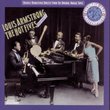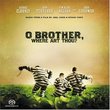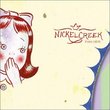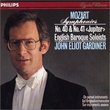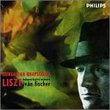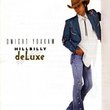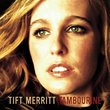| All Artists: George Butterworth, Ralph Vaughan Williams, Richard Hickox, London Symphony Orchestra Title: Vaughan Williams: A London Symphony (original 1913 version) / Butterworth: The Banks of Green Willow - London Symphony Orchestra / Richard Hickox Members Wishing: 1 Total Copies: 0 Label: Chandos Release Date: 5/22/2001 Genre: Classical Styles: Forms & Genres, Theatrical, Incidental & Program Music, Historical Periods, Modern, 20th, & 21st Century, Symphonies Number of Discs: 1 SwapaCD Credits: 1 UPC: 095115990223 |
Search - George Butterworth, Ralph Vaughan Williams, Richard Hickox :: Vaughan Williams: A London Symphony (original 1913 version) / Butterworth: The Banks of Green Willow - London Symphony Orchestra / Richard Hickox
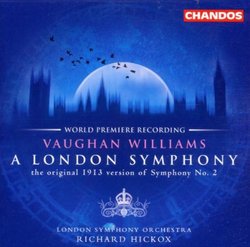 | George Butterworth, Ralph Vaughan Williams, Richard Hickox Vaughan Williams: A London Symphony (original 1913 version) / Butterworth: The Banks of Green Willow - London Symphony Orchestra / Richard Hickox Genre: Classical
Penned between 1911 and 1913 and first heard in May 1914, Vaughan Williams's A London Symphony was dedicated to the memory of George Butterworth (whose ravishing 1913 idyll The Banks of Green Willow opens proceedings here)... more » |
Larger Image |
CD DetailsSynopsis
Amazon.com Penned between 1911 and 1913 and first heard in May 1914, Vaughan Williams's A London Symphony was dedicated to the memory of George Butterworth (whose ravishing 1913 idyll The Banks of Green Willow opens proceedings here). It's the original version that Richard Hickox and the LSO champion so eloquently on this sumptuous-sounding Chandos issue--and a very different beast it is from Vaughan Williams's final revision of 1933. For starters, there's more than a quarter of an hour of extra material, much of it genuinely inspired and brimful of wondrous poetry. VW's scoring, too, was never more colorful, and it's surely not too fanciful to detect many a foreshadowing of Holst's The Planets. More significant, the work takes on a darker, tragic dimension (nowhere more potently, perhaps, than in the slow movement), and there's an astonishing passage in the expanded epilogue that even anticipates the opening movement of the 1921 Pastoral Symphony. In hindsight, VW made all the right decisions (the scherzo's second half, haunting though it is, pales next to the shuddering intensity of the revised coda), but no one should miss the opportunity to experience his original thoughts in all their epic sweep and tingling vitality. Utterly compulsive listening, then, and a "must buy" if ever I heard one. --Andrew Achenbach Similarly Requested CDs
|
CD ReviewsOriginal & beautiful thoughts Evan Wilson | Cambridge, MA | 12/04/2001 (5 out of 5 stars) "If you like the music of Vaughan Williams at all, you MUST get this disc because it is likely to be the only performance of the original version of the composer's 2nd symphony. Fortunately, the perfomance and sound are terrific so it is a worthy document.As for whether the additional 20 minutes of music Vaughan Williams later cut is worth the effort, that depends on what you're hoping to hear. If you're looking for incredibly beautiful music, you'll find it here. If you're looking for a coherent piece of music, you might want to stick with the 1936 revision available elsewhere which, although not perfect, pulls things together much more effectively than we hear here.Personally, I'll listen to both versions depending on my mood. I'm certainly glad to have this version which offers an incredibly nostalgic and beautiful coda which comprises one-third of the running time of the final movement. Further, the added repetitions in the slow movement of certain lyric passages are welcome. The second trio from the scherzo is a fascinating piece of music, but it's completely out of place with what surrounds it, so it's easy to understand why Vaughan Williams excised it. Given the fact that the listening public has grown used to the ramshackled musical structures of people like Elgar and Mahler, it's easy to understand how someone could contentedly wallow in this piece. Occasionally, however, I want a little more coherence, so from time to time I find it worth hearing Vaughan William's second thoughts about the 2nd symphony. For that, I turn to Barbirolli or Boult. (Both available at mid-price.) If I could only have one version of this, though, I suppose it be this one. Do try, though, to get this and the later revision, because Vaughan Williams wasn't wrong to think that the original version is a bit unwieldy." More than just adding 20 minutes of earlier cut material. Bob Zeidler | Charlton, MA United States | 07/15/2001 (5 out of 5 stars) "The London Symphony of Ralph Vaughan Williams (RVW) may be his best-known symphony, at least if judged on the basis of number of recordings and concert performances. While not strictly "programmatic," the quotation of the Big Ben (Westimster) chimes sequence that is a key musical phrase in the opening and closing movements certainly ties it to that city, and the luminous Scherzo captures the mood (and the fog) of the city at night at least as well as Gershwin caught the mood of Paris, to throw out one example. (RVW's characteristic "off-the-beat" accents in the Scherzo give it a jauntiness eerily similar to the "jazzy" accents that Gershwin used for his depiction of Paris. RVW simply got there ahead of Gershwin. By about 10 years or so. Interesting.) Over the years, various recordings by Sir Adrian Boult were part of my library (always adding the latest Boult version as it was released). High on my list of good performances, too, were those of Andre Previn and Bernard Haitink. I may never listen to any of them ever again. The reason why: By going back to RVW's original version of 1913, which restores about 20 minutes of material that he had removed over the years, through three revisions, ending with a 1936 edition that is the one normally heard (and the score version for all of the Boult, Previn and Haitink recordings in my library). True, some of the restored material could be considered "padding"; material too amorphous and diffuse to really add anything to the symphony. But there are two areas where the restored material are magic; no lesser description will do. The first is in the Scherzo, that fleet impression of London at night, where the restored material heightens the mood considerably while extending the movement by some minutes without in the slightest overstaying its welcome. Most of the restored material comes at the end of the Scherzo, where it now fades out with RVW's characteristically beautiful ability to "turn a phrase." The second, and far greater, improvement is to the final movement, and most particularly to the Epilogue of this movement, where now what one hears is an eerie precursor of the final ("Uranus") movement of Gustav Holst's "The Planets." This is not a point of reference that should be overplayed; each of RVW and Holst went his separate way with his respective material once past this initial "shock of recognition." Nevertheless, an astonishing bit to hear by someone who has heard both works many, many times. The booklet annotators make the point - valid to be sure - that RVW felt his 1936 revision to be his final say on the matter, and moreover that his revisions and excisions over the years were all his; all voluntary for purposes of tightening up the structure (unlike, as one of the annotators points out, the case of Bruckner, who experienced never-ending - and often awful - edits and revisions suggested by well-meaning but not well-informed "friends"). But this original version has captured my fancy, and my ears. Tough to go back now; it's that good. Bob Zeidler" "A symphony by a Londoner" - uncut Rodney Gavin Bullock | Winchester, Hampshire Angleterre | 05/24/2001 (5 out of 5 stars) "This recording of the original 1913 version of Vaughan Williams `A London Symphony' is not only outstanding in its own right but it is a historical document. Ursula Vaughan Williams, the composer's wife, gave special permission for this to be made as the composer was against performance of his original version. It follows that it will not make its way to the concert hall.The symphony was given its first performance in early 1914. `You really have done it this time!' wrote his friend Gustav Holst. The full score was soon lost in mysterious circumstances but was reconstructed from the orchestral parts. After the war he revised the symphony several times, the last in 1933. The final version was about twenty minutes shorter than the original, resulting in a much leaner, tighter work. So what was `lost'?`It [is] an enigma to me why these bars were removed, for in their magic and beauty they have caught something of London which Whistler captured in his Nocturnes.' So wrote Bernard Herrman, the American composer, referring to the slow movement. This is music of staggering beauty and occurs towards the end of the 2nd movement. In the scherzo you can hear a passage which VW called `nasty, modern stuff'. This begins at Track 4, 5:45. The orchestral writing is highly original and some people have spotted a similarity to Holst's Planet Suite- Neptune. In the final movement, the fast music is suddenly arrested by a much slower passage of almost Mahlerian anguish before returning to its familiar course. Then comes what VW called the `bad hymn tune' . It turns out to be no such thing, but instead a beautiful chorale. The epilogue is much longer and very beautiful indeed.Lewis Foreman, in a review of this disc in the BMS* News, expresses my feelings exactly: `..one is so used to the final version that it takes several hearings to get over the shock of familiar music suddenly switching into sections that were...cut...and then back again. And just how cherishable on its own account is the material he cut? Its like being taken back to some pre-bombing London and finding long-forgotten squares and alleys and evocative vistas that we thought had gone forever'. Vaughan Williams' creativity was at such a pitch that he had too much good material - it does not sag under its own weight, rather it is bursting at the seams.George Butterworth was a close friend of VW and offered useful criticism during the composition of the symphony. Tragically he was shot in 1916 and Vaughan Williams dedicated the work to him in memory of the younger man. Butterworth used two folk songs, which he had collected himself, in the idyll The Banks of Green Willow (1913). This short but lovely work is beautifully crafted and it is fitting that his music should share the same disc.The performance by the LSO under Richard Hickox is superlative. The reading is broad and the hushed intensity of the strings in the quiet passages is other-worldly. Chandos has exceeded even its high standards. The notes are by Stephen Connock, Chairman of the Ralph Vaughan Williams Society and Michael Kennedy, a friend of VW who has written an excellent book about his music. *British Music Society"
|

 Track Listings (5) - Disc #1
Track Listings (5) - Disc #1